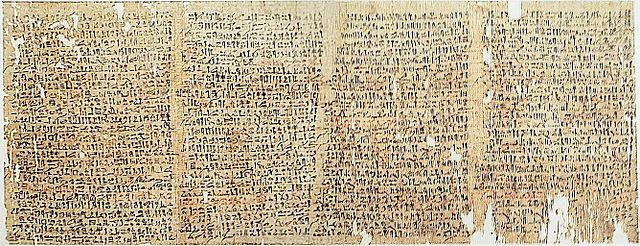The third story of the Westcar Papyrus is told by Bauefre, son of Khufu, and is set during the reign Sneferu. It tells of the time when the king, feeling very bored, goes for a sail, along with twenty attractive young women, on the advice of his chief lector priest, Djadjamankh. However, one of the girls drops a turquoise fish pendant in the water and is so upset by its loss that even the promise of a replacement from the royal treasury will not cheer her up. Djadjamankh then causes the water to fold over on itself so that the amulet can be retrieved (echoing the parting of the water by Moses during the Exodus).

The full translation…
Then Bauefre stood up to speak, and said: “I will let your majesty hear a wonder which happened in the time of your forefather Sneferu,justified, and is something that the chief lector priest Djadjamankh did”. Then he told the story of the green jewel.
[ ] day things have not happened. [Snefru went through] every room of the palace to seek distraction for himself but he couldn’t find any. The he said “go and bring me the chief lector priest and book scribe Djadjamankh and he was brought to him immediately. Then his majesty said to him “I have gone through every room of the palace to find distraction for myself but I couldn’t find any.”
Then Djadjamankh said to him “Oh, may your Majesty go to the lake of the palace, and man a ship with all beautiful women from inside your palace. The heart of your majesty will be cheered by seeing them row a trip back and forth and seeing the beautiful reeds of your lake and seeing its beautiful fields and water banks. Your heart will be gladdened by this so I will arrange a rowing trip.”
Let there be brought to me twenty oars of ebony plated with gold, their handles of sandalwood plated with electrum. Let there be brought to me twenty women with beautiful bodies, well developed breasts, who have braided, and who have not yet given birth. And let me be brought to me twenty nets and give these nets to these women after their clothes have been taken off”. All was done as his majesty commanded. Then they rowed back and forth and the heart of his majesty was gladdened by seeing them row.
Then one woman who was at the stroke oar got entangled in her braids and a fish pendant of real turquoise fell in the water. Then she became still, without rowing and her side became still, without rowing and his majesty said “can you not row?” and they said “our stroke has become still without rowing” and his majesty said to her “why are you not rowing?” and she said “this fish pendant of real turquoise has fallen into the water” then [he said] to [her] “[it shall be] replaced” and she said to him ” prefer the real one to a substitute” and then his majesty said “go and bring me the chief lector priest Djadjamankh and he was brought immediately.
Then his Majesty said “Djadjamankh, my brother, I have done what you said any the heart of his majesty was gladdened by seeing them row. Then a fish pendant of real turquoise on one of the strokes fell into the water and she became still without rowing. It so happened that she disrupted her side and I said to her “why are you not rowing” and she said to me “the fish pendant that was real turquoise has fallen into the water” and I said to her “Row, lo I myself will replace it” and she said to me “I prefer my own thing to its substitute”
Then the chief lector priest Djadjamankh spoke a spell and put one side of the weater of the lake on top of the other and found the fish pendant lying on a shard. He fetched it and gave it to its owner. Now the water was twelve cubits in the middle and it ended up being twenty-four cubits after being folded up. The he spoke a spell and the parts of the water of the lake returned to their positions. His majesty spent a day of celebration with the entire royal household and at the end he rewarded the chief lector priest Djadjamankh with every good thing.
Behold a wonder that happened in the time of your forefather, the King of Upper and Lower Egypt Sneferu, which is something the chief lector priest and book scribe Djadjamankh did.
Then his majesty the King of Upper and Lower Egypt Khufu said “let an offering be made of a thousand loaves of bread, a hundred jars of beer, one ox and two balls of incense to the King of Upper and Lower Egypt Senefru, justified, and let there be given one cake, one jug of beer, a large portion of meat and one ball of incense to the chief lector priest and book scribe Djadjamankh, as I have seen an example of his learning. One did as everything as his majesty had ordered.
Adapted from translations by Marc Jan Nederhof and A.M. Blackman